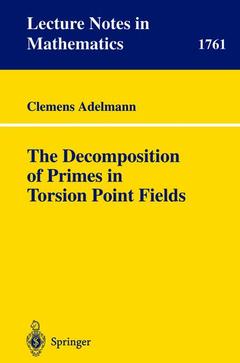Description
The Decomposition of Primes in Torsion Point Fields, 2001
Lecture Notes in Mathematics Series, Vol. 1761
Author: Adelmann Clemens
Language: English
Approximative price 36.87 €
Subject to availability at the publisher.
Add to cart
Publication date: 05-2001
148 p. · 15.5x23.5 cm · Paperback
148 p. · 15.5x23.5 cm · Paperback
Description
/li>Contents
/li>Comment
/li>
It is an historical goal of algebraic number theory to relate all algebraic extensionsofanumber?eldinauniquewaytostructuresthatareexclusively described in terms of the base ?eld. Suitable structures are the prime ideals of the ring of integers of the considered number ?eld. By examining the behaviouroftheprimeidealswhenembeddedintheextension?eld,su?cient information should be collected to distinguish the given extension from all other possible extension ?elds. The ring of integers O of an algebraic number ?eld k is a Dedekind ring. k Any non-zero ideal in O possesses therefore a decomposition into a product k of prime ideals in O which is unique up to permutations of the factors. This k decomposition generalizes the prime factor decomposition of numbers in Z Z. In order to keep the uniqueness of the factors, view has to be changed from elements of O to ideals of O . k k Given an extension K/k of algebraic number ?elds and a prime ideal p of O , the decomposition law of K/k describes the product decomposition of k the ideal generated by p in O and names its characteristic quantities, i. e. K the number of di?erent prime ideal factors, their respective inertial degrees, and their respective rami?cation indices. Whenlookingatdecompositionlaws,weshouldinitiallyrestrictourselves to Galois extensions. This special case already o?ers quite a few di?culties.
Decomposition Laws.- Elliptic Curves.- Elliptic Modular Curves.- Torsion Point Fields.- Invariants and Resolvent Polynomials.
Includes supplementary material: sn.pub/extras
© 2024 LAVOISIER S.A.S.
These books may interest you

Cryptographic Applications of Analytic Number TheoryComplexity Lower Bounds and Pseudorandomness 105.49 €

Number Theory 105.49 €


